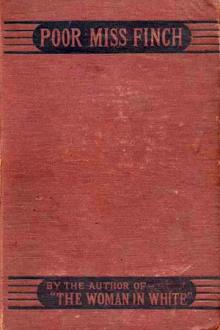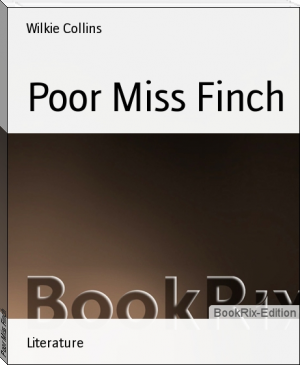Poor Miss Finch - Wilkie Collins (best books to read for beginners txt) 📗

- Author: Wilkie Collins
- Performer: -
Book online «Poor Miss Finch - Wilkie Collins (best books to read for beginners txt) 📗». Author Wilkie Collins
He left me at the door, with a gentle encouraging pressure of my hand.
“I will call again later,” he said; “and hear what Grosse’s report of you is, before he goes back to London. Rest, Lucilla—rest and compose yourself.”
A heavy footstep sounded suddenly behind us as he spoke. We both turned round. Time had slipped by more rapidly than we had thought. There stood Herr Grosse, just arrived on foot from the railway station.
His first look at me seemed to startle and disappoint him. His eyes stared into mine through his spectacles with an expression of surprise and anxiety which I had never seen in them before. Then he turned his head and looked at Oscar with a sudden change—a change, unpleasantly suggestive (to my fancy) of anger or distrust. Not a word fell from his lips. Oscar was left to break the awkward silence. He spoke to Grosse.
“I won’t disturb you and your patient now,” he said. “I will come back in an hour’s time.”
“No! you will come in along with me, if you please. I have something, my young gentlemans, that I may want to say to you.” He spoke with a frown on his bushy eyebrows, and pointed in a very peremptory manner to the house-door.
Oscar rang the bell. At the same moment my aunt, hearing us outside, appeared on the balcony above the door.
“Good morning, Mr. Grosse,” she said. “I hope you find Lucilla looking her best. Only yesterday, I expressed my opinion that she was quite well again.”
Grosse took off his hat sulkily to my aunt, and looked back again at me—looked so hard and so long, that he began to confuse me.
“Your aunt’s opinions is not my opinions,” he growled, close at my ear. “I don’t like the looks of you, Miss. Go in!”
The servant was waiting for us at the open door. I went an without making any answer. Grosse waited to see Oscar enter the house before him. Oscar’s face darkened as he joined me in the hall. He looked half angry, half confused. Grosse pushed himself roughly between us, and gave me his arm. I went upstairs with him, wondering what it all meant.
September 4th (continued).
ARRIVED in the drawing-room, Grosse placed me in a chair near the window. He leaned forward, and looked at me close; he drew back, and looked at me from a distance; he took out his magnifying glass, and had a long stare through it at my eyes; he felt my pulse; dropped my wrist as if it disgusted him; and, turning to the window, looked out in grim silence, without taking the slightest notice of any one in the room.
My aunt was the first person who spoke, under these discouraging circumstances.
“Mr. Grosse!” she said sharply. “Have you nothing to tell me about your patient to-day? Do you find Lucilla–-”
He turned suddenly round from the window, and interrupted Miss Batchford without the slightest ceremony.
“I find her gone back, back, back!” he growled, getting louder and louder at each repetition of the word. “When I sent her here, I said—‘Keep her comfortable-easy.’ You have not kept her comfortable-easy. Something has turned her poor little mind topsy-turvies. What is it? Who is it?” He looked fiercely backwards and forwards between Oscar and my aunt—then turned my way, and putting his heavy hands on my shoulders, looked down at me with an odd angry kind of pity in his face. “My childs is melancholick; my childs is ill,” he went on. “Where is our goot-dear Pratolungo? What did you tell me about her, my little-lofe, when I last saw you? You said she had gone aways to see her Papa. Send a telegrams—and say I want Pratolungo here.”
At the repetition of Madame Pratolungo’s name, Miss Batchford rose to her feet and stood (apparently) several inches higher than usual.
“Am I to understand, sir,” inquired the old lady, “that your extraordinary language is intended to cast a reproach on my conduct towards my niece?”
“You are to understand this, madam. In the face of the goot sea-airs, Miss your niece is fretting herself ill. I sent her to this place, for to get a rosy face, for to put on a firm flesh. How do I find her? She has got nothing, she has put on nothing—she is emphatically flabby-pale. In this fine airs, she can be flabby-pale but for one reason. She is fretting herself about something or anodder. Is fretting herself goot for her eyes? Ho-damn-damn! it is as bad for her eyes as bad can be. If you can do no better than this, take her aways back again. You are wasting your moneys in this lodgment here.”
My aunt addressed herself to me in her grandest manner.
“You will understand, Lucilla, that it is impossible for me to notice such language as this in any other way than by leaving the room. If you can bring Mr. Grosse to his senses, inform him that I will receive his apologies and explanations in writing.” Pronouncing these lofty words with her severest emphasis, Miss Batchford rose another inch, and sailed majestically out of the room.
Grosse took no notice of the offended lady: he only put his hands in his pockets, and looked out of window once more. As the door closed, Oscar left the corner in which he had seated himself, not over-graciously, when we entered the room.
“Am I wanted here?” he asked.
Grosse was on the point of answering the question even less amiably than it had been put—when I stopped him by a look. “I want to speak to you,” I whispered in his ear. He nodded, and, turning sharply to Oscar, put this question to him:
“Are you living in the house?”
“I am staying at the hotel at the corner.”
“Go to the hotel, and wait there till I come to you.”
Greatly to my surprise, Oscar submitted to be treated in this peremptory manner. He took his leave of me silently, and left the room. Grosse drew a chair close to mine, and sat down by me in a comforting confidential fatherly way.
“Now my goot-girls,” he said. “What have you been fretting yourself about since I was last in this house? Open it all, if you please, to Papa Grosse. Come begin-begin!”
I suppose he had exhausted his ill-temper on my aunt and Oscar. He said those words—more than kindly—almost tenderly. His fierce eyes seemed to soften behind his spectacles; he took my hand and patted it to encourage me.
There are some things written in these pages of mine which it was, of course, impossible for me to confide to him. With those necessary reservations—and without entering on the painful subject of my altered relations with Madame Pratolungo—I owned quite frankly how sadly changed I felt myself to be towards Oscar, and how much less happy I was with him, in consequence of the change. “I am not ill as you suppose,” I explained. “I am only disappointed in myself, and a little downhearted when I think of the future.” Having opened it to him in this way, I thought it time to put the question which I had determined to ask when I next saw him.
“The restoration of my sight,” I said, “has made a new being of me. In gaining the sense of seeing, have I lost the sense of feeling which I had when I was blind? I want to know if it will come back when I have got used to the novelty of my position? I want to know if I shall ever enjoy Oscar’s society again, as I used to enjoy it in the old days before you cured me—the happy days, Papa-Grosse, when I was an object of pity, and when all the people spoke of me as Poor Miss Finch?”
I had more to say—but at this place, Grosse (without meaning it, I am sure) suddenly stopped me. To my amazement, he let go of my hand, and turned his face away sharply, as if he resented my looking at him. His big head sank on his breast. He lifted his great hairy hands, shook them mournfully, and let them fall on his knees. This strange behavior and the still stranger silence which accompanied it, made me so uneasy that I insisted on his explaining himself. “What is the matter with you?” I said. “Why don’t you answer me?”
He roused himself with a start, and put his arm round me, with a wonderful gentleness for a man who was so rough at other times.
“It is nothing, my pretty lofe,” he said. “I am out of sort, as you call it. Your English climates sometimes gives your English blue devil to foreign mens like me. I have got him now—an English blue devil in a German inside. Soh! I shall go and walk him out, and come back empty-cheerful, and see you again.” He rose, after this curious explanation, and attempted some sort of answer—a very odd one—to the question which I had asked of him. “As to that odder thing,” he went on, “yes-indeed-yes. You have hit your nail on his head. It is, as you say, your seeings which has got in the way of your feelings. When your seeings-feelings has got used to one anodder, your seeings will stay where he is, your feelings will come back to where they was; one will balance the odder; you will feel as you did; you will see as you didn’t; all at the same times, all jolly-nice again as before. You have my opinions. Now let me walk out my blue devil. I swear to come back again with a new inside. By-bye-my-Feench-goodbye.”
Saying all this in a violent hurry, as if he was eager to get away, he gave me a kiss on the forehead, snatched up his shabby hat, and ran out of the room.
What did it mean?
Does he persist in thinking me seriously ill? I am too weary to puzzle my brains in the effort to understand my dear old surgeon. It is one o’clock in the morning; and I have still to write the story of all that happened later in the day. My eyes are beginning to ache; and, strange to say, I have hardly been able to see the last two or three lines I have written. They look as if the ink was fading from them. If Grosse knew what I am about at this moment! His last words to me, when he went back to his patients in London, were:—“No more readings! no more writings till I come again!” It is all very well to talk in that way. I have got so used to my Journal that I can’t do without it. Nevertheless, I must stop now—for the best of reasons. Though I have got three lighted candles on my table, I really cannot see to write any more.
To bed! to bed!
[Note.—I have purposely abstained from interrupting Lucilla’s Journal until my extracts from it had reached this place. Here the writer pauses, and gives me a chance; and here there are matters that must be mentioned, of which she had personally no knowledge at the time.
You have seen how





Comments (0)